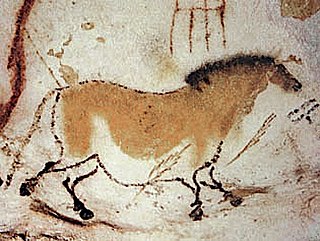Cro-Magnon
Sub-species of homo sapiens from the lower palaeolithic From Wikipedia, the free encyclopedia
The earliest known Cro-Magnon remains are between 35,000 and 45,000 years old,[1][2] based on radiometric dating. The oldest remains, from 43,000 – 45,000 years ago, were found in Italy[2] and Britain.[3] Other remains also show that Cro-Magnons reached the Russian Arctic about 40,000 years ago.[4][5]


Cro-Magnons had powerful bodies, which were usually heavy and solid with strong muscles. Unlike Neanderthals, which had slanted foreheads, the Cro-Magnons had straight foreheads, like modern humans. Their faces were short and wide with a large chin. Their brains were slightly larger than the average human's is today.[6][7]
Naming
The name "Cro-Magnon" was created by Louis Lartet, who discovered the first Cro-Magnon skull in southwestern France in 1868. He called the place where he found the skull Abri de Cro-Magnon.[8] Abri means "rock shelter" in French;[8] cro means "hole" in the Occitan language;[9] and "Magnon" was the name of the person who owned the land where Lartet found the skull.[10] Basically, Cro-Magnon means "hole on Magnon's land."
This is why scientists now use the term "European early modern humans" instead of "Cro-Magnons." In taxonomy, the term "Cro-Magnon" does not mean anything.[1]
Cro-Magnon life

- Used bones, shells, and teeth to make jewelry
- Spun, dyed, and tied knots in flax, to make cords for their tools, make baskets, or sew clothing
Like most early humans, the Cro-Magnons mostly hunted large animals. For example, they killed mammoths, cave bears, horses, and reindeer for food.[11] They hunted with spears, javelins, and spear-throwers. They also ate fruits from plants.
The Cro-Magnons were nomadic or semi-nomadic. This means that instead of living in just one place, they followed the migration of the animals they wanted to hunt. They may have built hunting camps from mammoth bones; some of these camps were found in a village in Ukraine.[12][13] They also made shelters from rocks, clay, tree branches, and animal skin (leather).[13]
Related pages
References
Wikiwand - on
Seamless Wikipedia browsing. On steroids.
